I have written an account of my family’s engagement with France as an op-ed in today’s Daily Telegraph. You can read it here.
My perception is that the transaction by which French Jews embraced the Republic in exchange for liberty, equality and fraternity has reached the point of breakdown.
A slightly longer (and more music-referenced) version of the article appears below.

In January 1992, I took my Uncle René to the Bastille. It was our last opportunity to go to the opera. René was about to join his daughter in Israel, ending three centuries of our family’s existence as French Jews – Jews who were as meticulous in their religious devotions as they were proud of their Republican heritage.
Our family lived in the ninth arrondissement and went to the opera at old Palais Garnier, a chandeliered relic of French pomp. René did not think much of the concrete Opéra Bastille. When I asked why he was leaving France, he said: ‘c’est terminé.’
For him, the glories of France were dead by 1992. The rift between the Republic and its Jewish citizens did not begin last week with Islamist attacks on cherished freedoms, on innocent families out shopping for the Sabbath. It has a longer history.
How proud was my family of being French? We trace our lineage back to the dawn of citizenship records, to 1727, in a village on the outskirts on Strasbourg. Our patriarch was Grand Rabbin of the Lower Rhine, the first Jewish preacher to deliver sermons in French. When the Germans occupied Alsace-Lorraine in 1870, we moved en masse to Paris. My ancestors were never going to live under any flag but the tricolor.
We founded an orthodox synagogue at the back of the Folies-Bergère. My Aunt Fifi would giggle as we passed display cases of half-naked entertainers, whispering to me what went on in there. A wooden board in the rue Cadet synagogue lists members of our family who gave their lives for France – who ‘fell on the field of honour’ in the Republican phrase – more than 20 at my last count, most in the First World War.
Aunt Fifi, born on August 2, 1914, would never marry; most French Jewish men of her generation were exiled or exterminated. The day she was born, my grandfather went off to the front, serving for the full four years, never omitting to wrap a Jewish talit around his French uniform at morning prayers.
In the Second War, a great-uncle, Samuel, was shot dead in the street by a German soldier. Other relatives were deported to death camps. My grandparents fled south, surviving by luck, wit and the kindness of strangers. Uncle René went underground with the Résistance. Peacetime or war, our loyalty to France was absolute.
I can barely imagine how their loyalty survived the Dreyfus Affair, when a Jewish army officer was falsely prosecuted for espionage, or the 1930s when large sections of French media promoted Nazi prejudices against Jews. But survive they did. For us, being Jewish and French are inseparable strands of identity. Our family tomb is in Montparnasse, at the very heart of French culture.
We embraced the Republic even when it impinged on core beliefs, requiring Jewish children, for instance, to attend school on the Sabbath day. We accepted the centrality of the state in exchange for its celestial values: liberty, equality and fraternal dialogue. The dogmas of the Republic were our guarantee of tolerance. We participated in the life of France, its culture, its economy. Some distant cousins became Christian; one is married to a Moslem. We were part of France until France ceased to be France.
And then we left.
Waves of North African immigration from the 1960s on were not a cause of our discontent. Those waves contained many Jews. Uncle René, annoyed by a young Israeli rabbi, stormed out of rue Cadet to form a new community with Moroccans and Tunisians. For a while, Paris seemed friendlier than ever and Jews a vital part of its élan. Bernard-Henri Lévy and Alain Finkielkraut, two popular TV philosophers, are avowedly Jewish. A celebrated bass-baritone at the Opéra, Laurent Naouri, belongs to a family of kosher supermarket owners.
But an alienated populace in the outer suburbs, ignored by the Republic and exploited by radical preachers, made Jews uneasy. Some streets were no longer safe to walk in a skullcap. Anti-semitic rhetoric was heard on the political right, on the left, and from the banlieus. Murderous attacks on Jewish schools aroused no national outrage on the scale seen in the past week. Economic decline accentuated the need to leave.
Jews fled in thousands – many to London, where two new communities have sprung up in my own neighbourhood. Some 3,300 left for Israel in 2013 according to official figures, rising to 5,000 last year. Many more acquired homes abroad.
France awoke too late to the exodus. Last September, the prime minister Manuel Valls, whose violinist wife is Jewish, put on a skullcap at a central synagogue and announced to the world that ‘a France without Jews is no longer France.’
This weekend, for the first time since the Nazi era, that same synagogue had to shut for the Sabbath because the state was unable to protect its worshippers. France is in a state of moral confusion. Yesterday a million marched in Paris and the impressive M. Valls declared: ‘We are all Charlie, we are all police, we are all Jews of France.’
How I long to believe that. My Jewish friends were out on the streets of Paris this weekend, hoping that, from this tragic moment, the tide will turn. Myself, I scrapped plans to attend the opening of the new Philharmonie on Wednesday, unable to pretend that life will go on as before. My history, as a Jew of France, is over.
© Norman Lebrecht
Hinse Mutter, double bass player and composer in Rotterdam, gathered local musicians of several nationalities to record a song he had written on the words of Stéphane Charbonnier, cartoonist and editor: ‘je préfère mourir debout que vivre à genoux’ (I’d rather die standing than live on my knees).
Fiona Maddocks has spotted significant trends today in the National Youth Orchestra of Great Britain, with 163 players.

The NYO bucks the trend: 52% of the new line-up is female, including the leader (Stephanie Childress, 15). Section principals are equally divided between boys and girls. The orchestra was founded by a woman, Ruth Railton. Its patron, chair, chief executive, finance director and rehearsal conductor are women. The world premiere commission for the orchestra’s 2015 Easter concert is by Unsuk Chin, and three of the NYO’s own six young composer members are female.
Read more here.
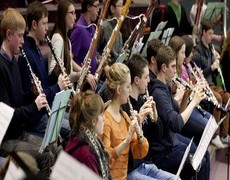
David Stevens shares with many others the ability to identify any note by ear, and the inability to ensure anything that sounds off-pitch. Perect pitch is the subject of current research. We asked David to describe it from the inside.
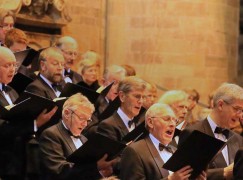
It is the 1950s. I am seven years old and have just started to have private piano lessons with a local piano teacher. Whether my parents somehow saw evidence of musicality in me or whether piano lessons for their offspring was what many middle-class parents aspired to, I cannot now say.
Quite early on I became aware that I could somehow identify an individual note on the piano by its pitch. Not knowing what to make of this I once invited my mother to come and sit at the keyboard while I left the room, shut the door and went into the hall. “Just play me any note you like,” I shouted through to her “and I’ll come in and show you which one you touched.” To her astonishment and surprise I was able to go straight to the note she had played and play it too. We repeated the experiment a few more times, with different notes, just to establish that I wasn’t somehow pulling the wool over her eyes. She must have regarded it as some kind of musical sorcery, although we never actually discussed it at length. Of course neither of us knew what to make of this curious aptitude. I know now that it was evidence of the possession of a kind of perfect pitch. Although I went on to do music A-level and to read music at university I don’t recall the topic of perfect pitch ever being discussed.
I have sung in amateur choirs from my student days but it was not until I took part in a performance of the Bach B Minor Mass in 1983 that I came to question the desirability of having a degree of perfect pitch. The so-called early music revival was in full swing at that time and as soon the rehearsal started I realized that this performance of Bach’s masterpiece was, to my ears, in Bb minor. I was going to have to mentally transpose every note down by a semitone. In such complex, often chromatic and swiftly-moving music, the concentration involved in transposing was overbearing. I hadn’t (and still haven’t) developed the ability to transpose whole phrases into a new key – each note was having to be processed separately.
Since then I have tried to avoid performing in concerts where I know that the music will be played at so-called baroque pitch. I have taken part in workshops of Renaissance music where the music has been at a lower pitch but I have somehow been able to cope with the simpler textures, a more limited intervallic range and more straightforward rhythms. Today,
I find that “my” perfect pitch – never truly perfect, anyway – has deteriorated somewhat.
I sometimes test myself by singing the opening note of a piece, whose key I know, and which is about to be played on the radio. I am often close to the opening note, but not always close enough – usually I’m slightly lower.
However, my perfect pitch is still sufficiently intact accurately to identify the keys of most pieces of “classical” music which I hear, even of works I have never heard before, and the knack can be useful when trying to identify excerpts of music played in the weekday morning Brain Teaser slot on Radio 3’s Essential Classics, especially the one in which the music is played backwards. On the whole I am pleased to have such a faculty, but there are occasions when it is a curse rather than a blessing.

This is the torch song from La Dolce Vita by Federico Fellini, written by Nino Rota in tribute to the heart-stopping beauty of Anita Ekberg, who died today, aged 83. It is sung by Katyna Ranieri, the first Italian singer ever to perform at the Oscars.

We have been informed of the shocking death of the tenor Carlo Scibelli, a few days after his 50th birthday.
Carlo, a much admired Manrico, appeared at San Francisco Opera, Los Angeles, Deutsche Oper Berlin, Covent Garden and the Teatro Colon. In recent years, he was based in New York.
He was taken to St. Luke’s Hospital on 114th Street and Amsterdam the day after New Year’s in acute pain and diagnosed with pacreatitis. Surgeons removed several gallstones and he seemed to be improving, but the inflammation did not respond to treatment. He died on Friday night of acute respiratory distress syndrome.
Our deep sympathies to his family and many friends.
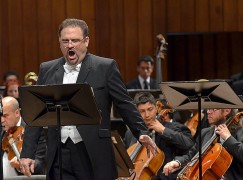
UPDATE: Carlo’s Aunt Carol has posted the following:
Chuck went to the emergency room at St. Luke’s Hospital on 114th Street and Amsterdam last Friday, the 2nd and he was diagnosed with Pancreatitis – had seven gall stones removed – they were blocking his pancreas causing tremendous inflammation. It became ARDS (Acute Respiratory Distress Syndrome) He had trouble breathing and he was taken to ICU where they put him on a respirator and kept him heavily sedated so that his lungs, which were affected would heal and so that the inflammation would go away. His buddy Jon Rosen stayed with him almost continually – I joined him on Monday. We watched his ‘numbers’ go in the “right direction” but always were reminded by the doctors and nurses that “he’s not out of the woods yet.” Still, all was looking up until Thursday, the 8th when his fever shot up to 105 and 106.3 (not a typo) Anti-biotics had no affect because the cause was not infection – it was from the inflammation that we all hoped and prayed would subside. It didn’t and by Friday, January 9th, despite incredible care by the doctors and nurses, Chuckie’s blood pressure dropped dangerously low and all other organs began to fail. He was surrounded by family and friends when he passed at 8:57 PM that evening. It is beyond heartbreaking and also heartwarming to see so many people feeling such grief and love for Chuck. He will be cremated and brought to California where his mother lives and near his nieces Kelsey, Carly and Natalie and brother-in-law John and, where his beloved sister, Suzie is buried. His son Jordan is nearby in Seattle. Soon, in another month or so we will have a Memorial for his New York friends and family to honor and celebrate the man we all loved so much. Please know that any and are welcome. The only thing required is a love in your heart for Carlo…
The French conductor Frédéric Chaslin, music director of the Jerusalem Symphony Orchestra, pulled out of last night’s performance of La Rondine in Tel Aviv after the company management refused to let him speak in memory of the victims of the Paris massacres.
Chaslin said he had intended to speak for thirty seconds and perform the national anthem, Hatikvah.
He had been dened that right on the grounds that ‘It would upset our audience’ and ‘It is against the management”s policies’. So he walked out.
He tells Slipped Disc: ‘The Tel Aviv Opera did not allow me to speak 30 seconds yesterday at the opera in homage to my French friends and citizens, including the 5 victims of the kasher store.’
Haaretz newspaper (in Hebrew) front-pages the story this morning.
Chaslin is quite right to be angry. This is not a major diplomatic incident, but a petty, stupid act of insensitivity and mismanagement at a company that veers from the despotic to the chaotic. Israel Opera desperately needs a change at the top.
Chaslin is conducting a homage to the victims with his own orchestra today.


A dignified response from a great artist:
![JOAN BAEZ_thumb[3]](https://slippedisc.com/wp-content/uploads/2015/01/JOAN-BAEZ_thumb3-243x180.jpg)
To the people of France,
I wish to send my deepest sympathy to those most closely affected by the executions at Charlie Hebdo, and to a French public in mourning. Liberals and conservatives in equal measure understand the value and importance, not to mention joy, of satire, humor, nonsense, and courage in the 21st century. Which makes the executions at Charlie Hebdo more than enraging, more than terrifying, more than shocking (as there is little left to shock us in these times). It makes the murders, simply, heartbreaking.
I ask permission to share in your grief.
Thank you,
Joan Baez
Seen the show several times. Seen the film. Bought all the recordings. Will go again.
Surely the most remarkable feat of Into the Woods is that it has turned Stephen Sondheim in his 85th year from dead-cert Broadway failure to Hollywood’s fastest selling musicals composer.
How did that happen? Commentary here.

Michael Volpe, director of London’s Holland Park Opera, has a memoir coming out shortly on his rise from ‘a backdrop of nuns, hit men, gangsters, rugby and ice-cream’ to the summits of vocal art.
Noisy at the wrong times is a lesson for our times when inner city children from poor backgrounds are written off, when cultural education is diminishing and aspirational leadership is little more than a platitude.
Read a first extract from Michael’s book exclusively on Slipped Disc. Order a pre-publication copy here.
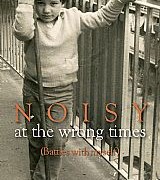
Doc Thornberry was a legend. He was the first rugby coach any of us had and he had taught hundreds of boys at Under Twelve’s. In fact Doc wasn’t much bigger than the eleven year olds he taught to play rugby. Doc also taught English and it would be fair to say he was one of the most radiant and inspirational teachers I ever had. He was unorthodox too, leaping up onto the desks and walking from table to table as he elucidated on some book, text or poem. He was transfixing, speaking at volume, then a whisper, eyes wide open, hands pressed into gesticulating action, but if your attention wandered, Doc would spring leopard-like across the desks, grab you by the hair and shake you senseless as he continued to recite Shakespeare or Keats. He wore Doc Marten shoes (hence the nickname) and these helped his balance, the cushioned soles offering rudimentary suspension as he bounced across four desks to his target. In the seventies, we all had long hair but Adebola didn’t. He wasn’t interested in Afros and kept his hair cropped short to his head, so when Doc leapt across to his desk one day, he scratched away at Adebola’s head trying to get purchase on the hair that wasn’t really there. After a short while of trying, he took hold of his ear instead and shook him by that. I often think of that little vignette as a metaphor for my school life – when shaking me one way didn’t work, somebody tried something different.
Doc was just as inspirational as a choirmaster, but I never saw him shake anyone by the hair in rehearsals. I don’t recall how I came to be in the choir – I must have auditioned – but I was a member of the junior choir in the first form so I was singing throughout my school career. I was only marginally less attentive and dedicated to music than theatre, enjoyed singing immensely and in my senior years I recall performing in various sections of the choir ranging from second tenor to second bass, so my range was acceptably wide. Our programme was challenging and varied too and we gave concerts not just to the school but also to the community at large. Doc had a remarkable ear for voices and could spot a flat note from a thousand paces when he would suddenly crouch low and stare, pointing accusingly at one section of the choir.
“Everyone stop, stop! First basses, on your own, quick!”
Having narrowed down the section, he would set about singling out the culprit until one poor soul would be singing solo, sounding just like the drain Doc had heard above the din of forty other voices. Being that person was unpleasant because a flat note sorely tested Doc’s patience and he would make you sing the part repeatedly until he was satisfied you had mastered it. I’m bound to say that the choir could sound magnificent and it’s peak for me was the performance of Handel’s Messiah when a local girls’ schools and other choirs joined us to provide the full range of voices required for the piece. We really let them have it with that one.
Despite the choirs at Woolverstone, it had become musically less ambitious than it’s earlier years. Weber’s masterpiece Der Frieschutz is a complex, beautiful opera but requires considerable vocal and orchestral forces, not to mention complicated staging since magic and all sorts of nonsense is involved. It provides a huge challenge for any professional company, but I was astonished to discover, on looking through some Woolverstone archives, that the school had produced the opera in the early sixties. Along with it, they had also performed some Britten (the composer actually visiting the school to see the production), Mozart’s The Magic Flute, Verdi’s Requiem, Menotti’s Amahl and the Night Visitors, The Mikado and even Smetana’s The Bartered Bride. These are hugely ambitious pieces but I’m not sure why they stopped – the rugby choir was the rump end of what had been a glorious musical and theatrical history. In 1962 alone, the school mounted productions of Bertolt Brecht’s Mother Courage, the aforementioned Smetana opera and finally George Bernard Shaw’s play of Androcles and the Lion. Other years were as equally challenging and remarkable. Perhaps the swinging sixties brought about the demise of such high classical endeavour but the school certainly continued to produce with seriousness, classical music and theatre. It must have required huge dedication and commitment on the part of masters too, in particular the music teacher Barry Salmon, although having the boys in school twenty four hours a day must have helped a bit. To bring young boys like us to the doorway leading to such high classical art is unimaginable today I feel. It is likely the boys involved never realised that when they took on Frieschutz, they were producing one of the great German operas of all time, but they would come to appreciate their enlightenment later in life. That was Woolverstone: anything and everything was possible and I can imagine the masters sitting down to devise the latest theatrical or musical wheeze, nobody wasting time wallowing in their cleverness.
Except for me.
I would wallow at the first opportunity even when signs of cleverness were thin on the ground so it’s easy to imagine how insufferable I could be. I thought I was clever at just about anything I turned my attention to and there was little anybody could do to dissuade me from thinking that, given the chance, I could have run the entire school better than the incumbent lot.
On stage, I could indulge all sorts of haughty, high stepping self-glorification and nobody would criticise me for it. Theatre and everything attached to it was my academic high point and it was where the dull, hard, battleship grey of my educational prospects took on a patina in which you could see the bright lights reflected.
The troubled Bergisch Symphony, music director Peter Kuhn, says it will go bust mid-season unless two towns, Remscheid and Solingen, come up with an extra 200,000 Euros. Details here.
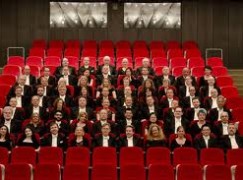
Arte have uploaded the Berlin Philharmonic New Year’s concert, attended by the German Chancellor.
Soloist in the Mozart piano concerto K488 is Menahem Pressler, aged 91, making no concessions to his age.
He comes in at 16′ on the video. Watch, and wonder.
Click here.











![JOAN BAEZ_thumb[3]](https://slippedisc.com/wp-content/uploads/2015/01/JOAN-BAEZ_thumb3-243x180.jpg)



